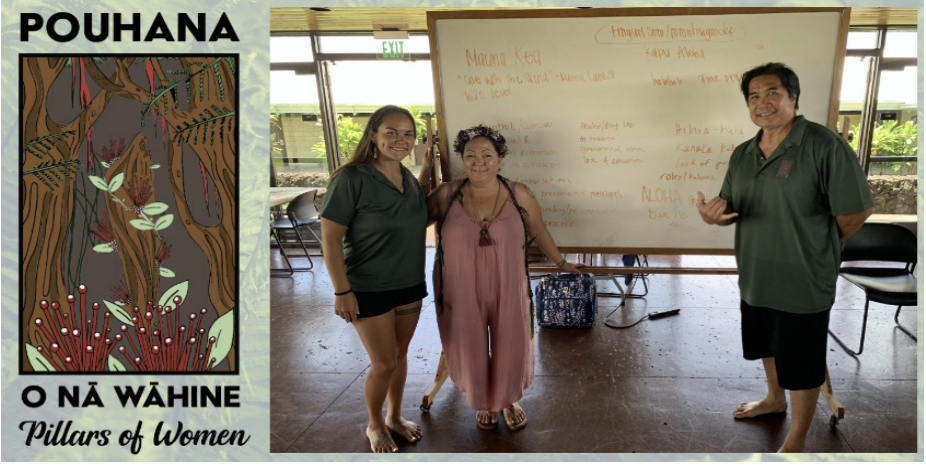Conversations With the Field (CWTF) Papa ‘Ōlelo Session Updates

in July. From left to right: Nikki Cristobal,
Dayna Schultz, and Vernon Viernes. / Photo
courtesy of Dayna Schultz.
A safe place for those in need of connecting and healing takes place at Pouhana O Nā Wāhine (PONW), the first Native Hawaiian Resource Center that focuses on Domestic Violence by and for Native Hawaiians. PONW is dedicated to restoring the Native Hawaiian way of life by being rooted in the beliefs, practices, and ceremonies our Indigenous relatives have done for many generations.
The Papa ‘Ōlelo is PONW’s adaptation of the National Indigenous Resource Center’s CWTF (Conversations with the Field recently changed to Conversations with Communities) community engagement and facilitation tool used to gather and share information. The Papa ‘Ōlelo aims for survivors and service providers to voice their moʻolelo (stories that can encourage and enhance healing with the intentions to “Hoʻolohe” (listen/hear), create a puʻuhonua (refuge), and provide an opportunity for survivors to use their leo (voices) “to break the silence” of their ʻeha and kaumaha (pain and grief).
While the goal is to bring this healing opportunity to Hawaiʻi-wide, to date, PONW’s Papa ‘Ōlelo sessions have been held on Oʻahu, Hilo, and Kauaʻi via in-person and virtual. The focus of these sessions is on the survivors’ and service providers’ moʻolelo, which includes their manaʻo (opinions/beliefs/ thoughts) about the contributing factors of domestic violence in their community, solutions to address domestic violence, and how culture can be a role in helping survivors heal when dealing with many forms of abuse. When PONW asks survivors and service providers to share their moʻolelo, the main objective is for survivors and providers to focus on healing through the roots of practices and beliefs in the Native Hawaiian culture and kōkua (help) us to build a solid kahua (foundation) for this resource center to thrive well into the future.
From PONW’s Papa ʻŌlelo sessions, the survivors and service providers have identified various forms of abuse, including mental, physical, emotional, spiritual, cultural, and financial. Through these types of abuse, survivors and providers have shared common risk factors, such as intergenerational trauma, colonization, toxic masculinity, parental and familial alienation, and capitalism. From one of the PONW Papa ‘Ōlelo sessions, a survivor shared that ʻOhana (family) can be contributors to the abuse in that they abide by problematic beliefs and practices about how women should act in abusive situations. She stated,“[In my ʻohana] it’s not okay to leave the abuse because you leave your family behind.” Survivors/providers also shared many forms of oppression — individual ʻohana, kaiāulu (community), and systems — while navigating abusive situations, including feeling as if the system causes more trauma and the process of coming to the awareness that they are victims because violence was normalized in their upbringing. This further reflects how the generational impact leads survivors to remain strong in their silence rather than with their voices.
Survivors shared that the colonized form of our culture can be a risk factor through being silenced and rendered invisible in the abuse and stripped of their cultural identity, leading to the repeated cycle of generational trauma. Specifically, survivors mentioned intergenerational challenges in the social acceptance of talking about the abuse, rigid gender roles, and the way Native Hawaiian cultural practices are discouraged. For example, one survivor spoke about her abuser shunning the cultural practice of laʻau lapaʻau (traditional medicinal healing using plants) and resorting to Western medications, highlighting how Native Hawaiians experience a cultural aspect to abuse.
At all Papa ʻŌlelo sessions, survivors and service providers mentioned needing more abuser accountability. One provider stated, “There needs to be more education, more resources where self-development, self-worth, and accountability are explored for abusers, where we are using preventative vs. punitive measures so they actually show up to get the help they need.”
Survivors and service providers also mentioned an abundance of strengths in navigating abuse. Being connected to one’s ʻohana and culture was stated to be a protective factor by survivors and providers. A survivor said that what helped her navigate out of an abusive relationship was “knowing the importance of healthy family support, mentorship, understanding what it means to have a piece of [my Hawaiian] identity.” At all of the Papa ʻŌlelo sessions, service providers and survivors expressed needing more spaces like the Papa ʻŌlelo where survivors and providers can feel safe to talk honestly and openly about their experiences in community with those from their own culture and with shared lived experiences. Survivors shared a large protective factor: Having available, affordable, and safe housing to escape the abuse. The housing crisis in Hawaiʻi was one of the most prominent risk factors stated by survivors and providers. Solutions offered by both survivors and service providers were establishing housing communities that use ʻāina (land; that which feeds) as a way to heal, feed themselves and their ʻohana, and create a kaiāulu that is responsive to the needs of Native Hawaiian survivors and the whole ʻohana unit.
Survivors and service providers have commonly expressed the need to continue to “talk about it,” learn the different ways to heal, and have an open space where people can turn to. As PONW Board of Director, Aunty Nani Fay Paglinawan has stated, “When I acknowledge where I come from, I’m healing, and when I heal myself, I help to heal my mother, my mother’s mother, my mother’s mother’s mother.”
To honor and respect survivors’ confidentiality, PONW Papa ‘Ōlelo ensures closed sessions with survivors separate from providers while allowing both groups to express strengths and challenges to PONW’s Papa ‘Ōlelo gatherings. The Papa ʻŌlelo sessions thus far demonstrate the need to create more spaces like these that give survivors a safety net to honestly share their experiences, emphasizing that they are not alone. PONW Papa ‘Ōlelo sessions are about the empowerment of what a safe place can provide to those who are healing or need healing by restoring our Native Hawaiian way of life.





